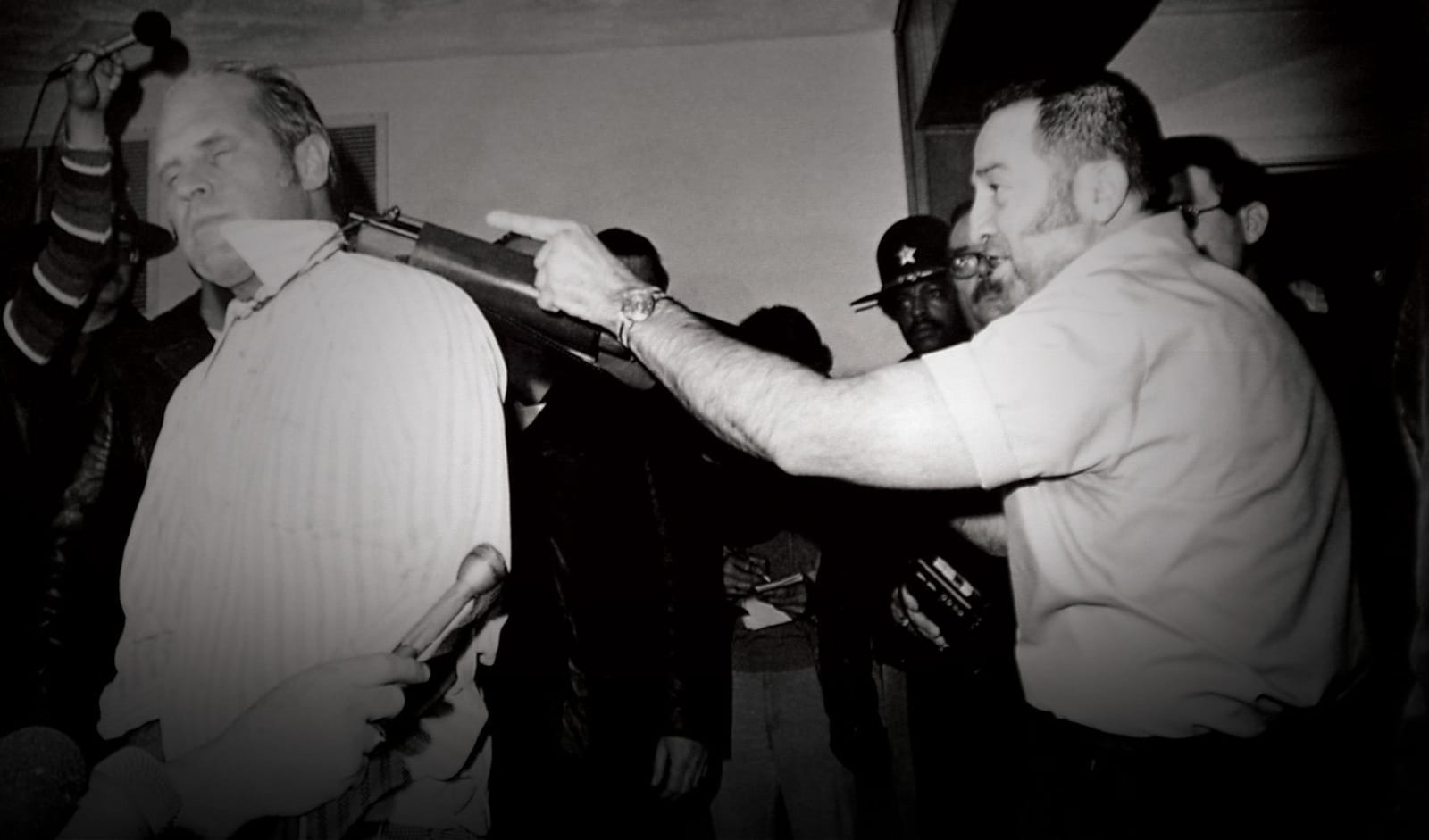Carly Dee would always remember the moment she saw the man with the sawed-off shotgun. 9:04am on February 8, 1977. One of those dead blue Midwestern mornings when everything felt heavy and grim. Waiting for the crosswalk signal, she blew on her chapped hands and stomped her feet in the slush on the corner of Market and Pennsylvania. An electric ripple shot through the crowd. Screams and shouts: Oh god. He’s got a gun. Just calm down. Don’t do it.
A middle-aged man shuffled toward her like a drunk, all arms and shoulders with his head hung low, keeping track of his feet. His untucked dress shirt flapped in the winter breeze. He looked like a good Republican, someone who might file your tax return or issue a permit. He looked like Gerald Ford. Then she saw the wire across his throat and the tears in his eyes, as if somebody was strangling him with a clothes hanger. The wire led to the barrel of a gun jammed against the back of the man’s neck, and Carly Dee knew it was a sawed-off shotgun even though she’d never seen one before.
The man with the gun frightened her. Crisp Elvis sideburns and two-day stubble, a stocky build and gnarled fingers like he worked with machines. Maybe he did. After all, he’d rigged up something special with that shotgun and the wire running to the trigger. “You mess with me and a bullet goes right in this guy’s head!” he screamed. He called it his “dead man’s line,” he said as he frog-marched his hostage forward. That’s when Carly Dee got a look at his eyes, dark wet eyes that looked scared like a rabbit. Cops swarmed the sidewalk and pushed everybody out of the way. “Back up!” they ordered. “Give them some room.” As if the kidnapper and victim were putting on a show.
She went home and watched it on television. Everybody did. Tony Kiritsis hijacked a police car and took Richard Hall to his apartment on the far west side, out near the airport. He held Hall captive for three days. Sixty-three hours to be exact. The television and radio kept close track of the time, as if each additional hour marked some kind of achievement, a new record for modern life. Kiritsis did radio interviews via telephone. Turned out that Hall was a mortgage broker and Kiritsis thought he was being ripped off. He had also fallen behind on his mortgage payments. “People in other countries take hostages for political reasons,” said Carly Dee’s father. “Americans do it for real estate.”
Carly Dee sat in front of the television, watching the reporters camped outside Kiritsis’s apartment building, pointing their cameras and microphones at neighbors who shook their heads and said they didn’t understand it, that Kiritsis was “always so helpful and kind, a hard worker, and a strict law-and-order sort of man.” Everybody looked happy to be on TV. She watched the round the clock coverage and fell asleep wanting more. What did the two men talk about? What did they eat?
Two days later, Kiritsis called a press conference on the steps of his apartment building. The press was already there. With red scars around his neck and the business end of the sawed-off pressed against his skull, Hall read a statement apologizing for the behavior of Meridian Mortgage Company. He mumbled and nearly wept. Kiritsis snatched his script away and began reading a list of demands that veered into the troubled and profane. His voice got scratchy and loud and his body began to shake. Fearing that Kiritsis might murder Hall on live TV, the networks cut the feed. And in her living room, Carly Dee was horrified at the momentary flicker of disappointment that she would not be able to watch it.
Kiritsis released Hall and fired a shot into the air. He pled insanity and was institutionalized until 1988 because he refused to submit to a psychological evaluation. He died in 2005 at the age of seventy-two. Hall never spoke about that day.
Anthony G. Kiritsis. Look him up some time. “Tony Kiritsis was an American kidnapper,” say the encyclopedias and obituaries. This is his legacy. But Carly Dee knows there’s more to the story. The only reason he did what he did was because he knew she would watch.





